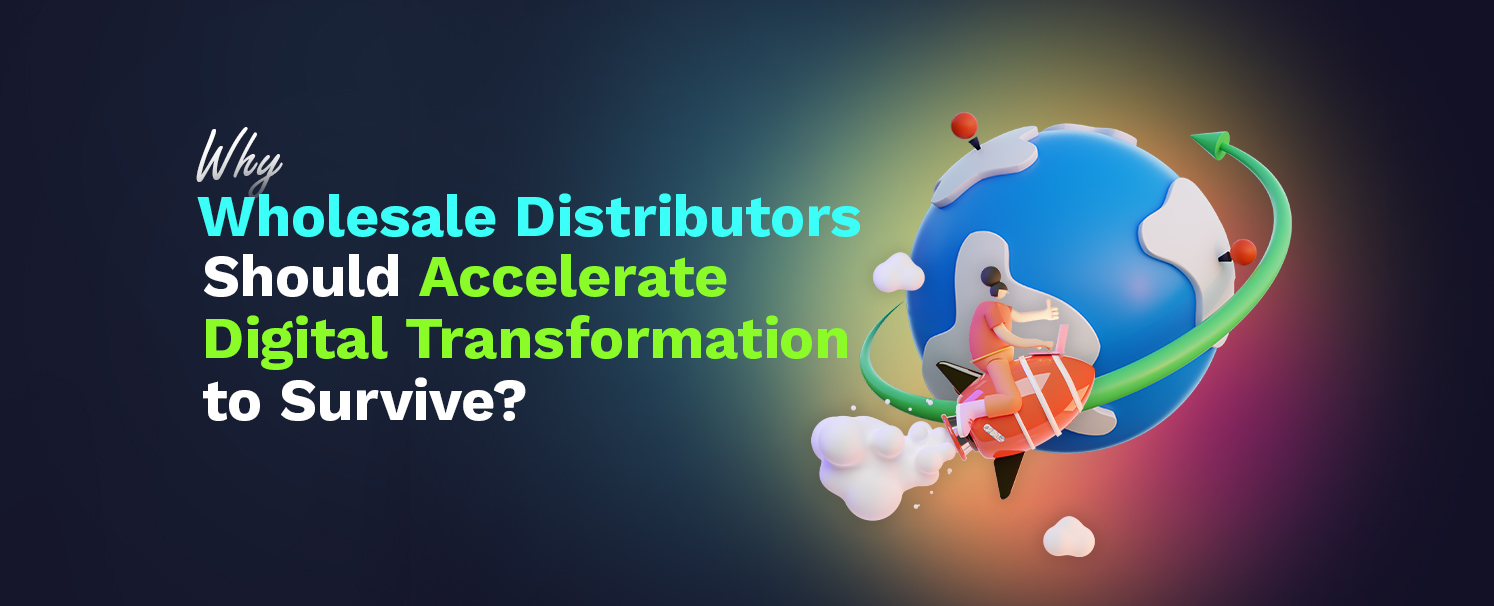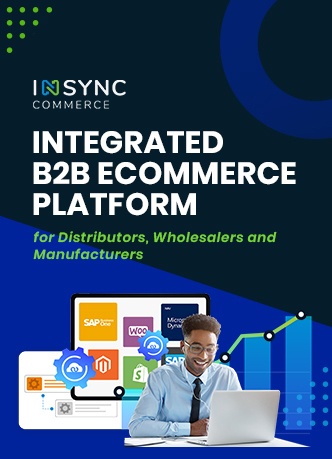
Change is the only constant. Everything needs to adapt and evolve to survive in its changing environment. The same applies to wholesale distribution businesses as well. Shifting global economic, political, and environmental factors can lead to sharp changes to customer demands and purchase behavior overnight. Events that have a global impact like the COVID-19 pandemic can permanently alter the course of industry trends. Aside from the pandemic, several other market factors are causing an effect on the wholesale distributor industry and will continue to shape it long into the future. The wholesale distribution industry thus needs to adopt tools to better adapt to a more rapidly changing market to survive.
The trends that are shaping the future of the wholesale distribution industry today…
While several factors are currently affecting the wholesaler market, there are primarily three trends that the industry must consider moving forward.
The rise of the digital marketplace
Online digital marketplaces are slowly taking over the market share of traditional wholesalers. With the development of online technologies, marketplaces can provide customers the convenience of shopping straight from their homes. Moreover, as marketplaces do not need to focus on managing a physical store, they can instead focus those resources on providing a better-customized experience to customers.
Traditional wholesale distributors fall short compared to online marketplaces when it comes to providing the personalized buyer experience that customers today are looking for and thus fail to stay competitive.
Dysfunctional supply chains
With COVID waves still popping up at various places globally, the worldwide supply chain is still in disarray. The disrupted global supply chains caused by the pandemic and international regulatory restrictions have crippled wholesaler-distributors from procuring their materials through exports. Another issue brought on by the dysfunctional supply chain is longer lead times for delivery by the distributors. Thus, distributors need to put in resources to establish reliable supply chains and invest in tools that can better help them provide their customers with reliable insight into when their orders will be fulfilled. While there may be an increased lead time for deliveries, providing a better customer experience and frequent updates regarding deliveries can ensure long-term customer loyalty.
Lack of talent in the industry
One of the main difficulties the wholesaler industry is currently facing is the lack of new talent. The new-age talent pool, both in the technical and managerial roles, is more inclined towards working in companies that take a social stance or aim to serve a greater purpose. The wholesaler industry has traditionally only focused on managing supplies and profits without any larger long-term goals. The wholesaler market also suffers from a poor social media presence. So, even if they have a social purpose, most of it is not communicated well enough through social media, which acts as a platform to educate and drive interest in potential talent. Without new talent coming into the market, the wholesale distributor industry is becoming stagnant and is unable to incorporate innovative ideas and technologies to stay competitive.
Want to eliminate your eCommerce challenges and gain excellence in your business? Employ our robust B2B eCommerce Platform that helps you transform your eCommerce game. Get started with your B2B eCommerce store and gain a competitive edge in the market!
Also, if you have multiple systems running in your business, connect all of them under one single platform to automate the process and improve your productivity and efficiency!
The pandemic behind the paradigm shift
It is no new news that the COVID-19 pandemic has left a permanent mark in the marketplace. From broken supply chains to the global economic crunch, businesses in all walks of the industry had to adapt and evolve overnight to survive in this new era. The COVID-19 pandemic became a massive restraint to the growth of the wholesale market as supply chains got disrupted due to international trade restrictions and consumption declined due to lockdowns imposed by governments globally. All the primary sub-sectors that the wholesale industry caters to, like the Healthcare, Industry Goods, Technology, and Food Services industries, faced severe setbacks due to these global changes.
Healthcare
The healthcare industry was at the brunt of the COVID pandemic and faced the most impact of it. In the beginning stages of the pandemic, the pharmaceutical supply chain saw massive order surges. With the increased panic buying of medicines, the manufacturing hubs of pharmaceuticals like India and China faced severe logistical difficulties. With initial waves of the pandemic subsiding, the demand for medical supplies has begun normalizing, yet in many regions of the world, demands still exceed supply.
In the short and mid-term, the medical manufacturing industry will impose mandates to manage demands. Wholesale distributors will need to adapt to meet these demands by restructuring their supply chain. Only through the adoption of agile and intelligent technology can the wholesale industry manage these demands.
Industry Supplies
The industrial supplies distribution industry was the worst affected of all the wholesale distribution segments. While the healthcare sector faced difficulties in managing demands, the industrial distribution sector suffered from dwindling orders. With the economic crunch, many industrial supply plants are either shutting down or laying off employees, and the ones operating are running out of supplies to continue manufacturing.
Prices had to be reduced by several distributors to accommodate the declining demand while logistic costs rose simultaneously. Technologically enabled industrial wholesale distributors that could cater through eCommerce platforms are the only ones able to increase their revenues, while distributors that depend on traditional sales processes are encountering a decline in business. Investment in competitive technology solutions will be necessary for industrial distributor wholesalers to stay operational until this sub-segment recovers.
Technology manufacturing
The wholesale distributor in the technology sector had faced some effects of the pandemic but managed to ride out the pandemic with minimum issues. With lockdowns being imposed globally due to the pandemic and businesses shifting to remote work models, the need for an infrastructure to support this massive shift escalated the demands within the technology industry.
With the rise of cloud-based business processes and work-from-home technology, the industry saw an exponential increase in demand, especially for silicon semiconductor chips. The surge in demand for personal electronic devices such as cell phones and laptops that use these chips led to a point where production could not keep pace with demand. The sub-sector is held down only due to its inability to fulfill customer demands. Ironically, the technology distribution sector needs to invest in technology to improve lead time and supply chain logistics management for a quick revival.
Food Services
Food services distribution is another one of the most affected sub-sectors of the wholesale distribution industry. The food industry accounts for much of the success of the general economy. The net value of this segment amounts to more than the valuation of the agriculture, airline, railroad, ground transportation, and sports entertainment industries combined.
With reduced footfalls to restaurants and hotels, the foodservice distribution industry must invest in technologies such as online food ordering, food delivery network management, online payment transactions, and automation tools that seamlessly manage all these elements to stay competitive and survive and eventually recover in the long term.
The era of Digital Competition
The need to survive in the post-pandemic era has forced the B2B wholesale distribution industry to undergo a massive technological paradigm shift. Usually, during times of global crisis, companies slow down their investment in adopting new technologies. But during the pandemic, the contrary was noted. Most organizations continued to grow their technological foundation, and in some cases, increased the rate at which they were undergoing a digital transformation.
The shift to a more technology-driven business model that started as a crisis response has become the industry standard. Both wholesale businesses and customers prefer the new digital reality. Even as lockdowns are getting lifted, buyers and sellers are still opting for online remote human communications over face-to-face interactions. One of the main reasons for this is obviously safety but also because self-serve and online interactions have made it easier for buyers to get better information and order insights while customers enjoy faster and more convenient service. According to a study by McKinsey, around 70-80 percent of B2B business decision-makers are opting for self-serve online interactions over traditional in-person communications. The fact B2B decision-makers are choosing to make new purchases in large volumes and reorder through online platforms is a notable sign that digital wholesale is commerce coming to maturity and is going to pave the way forward into the future.
This shift may not have been possible even a few years ago, but the rise of technologies such as live video conferences, real-time logistics tracking, automated inventory management, and much more has made the transformation more convenient.
With most businesses now shifting towards developing a robust digital foundation and customers also preferring online business interactions, wholesale distributors still functioning on a traditional model are now facing a two-fold problem, the difficulty to continue business under an economic crunch and increased competition from companies shifting to a more customer-friendly digital infrastructure. Thus, wholesale distributors that are still holding on to traditional means of conducting business operations must undergo a complete revamp in their approach to conducting business and accelerate their digital transformation to survive in this new market.
Key benefits of an Integrated B2B eCommerce platform for wholesale distributors
Shifting to a new workflow can be an uphill task, and many organizations may not wish to undergo the difficulties associated with it, but with the changing environment of the global wholesale industry, distributors must go through a digital transformation through the integration of a B2B eCommerce platform to survive. So let us take a look into the benefits an Integrated B2B Commerce Platform can provide to a wholesale distributor business.
Effective management of supply chains
One of the biggest complications brought on by the pandemic has been the failing supply chain network. Through the help of a B2B eCommerce platform, businesses can provide a platform where suppliers and customers can get a smooth and seamless flow of transactions. The platform also removes the traditional need for repeated back and forth communications between the distributor and customer by replacing it with a single button click. Another factor that helps manage supply is that when placing an order through a B2B eCommerce platform, the customer gets immediate data on how much stock the seller has readily available, how long the delivery will take, and get automated tracking data of the orders.
Reach new markets
A wholesale distributor with a brick-and-mortar store has a limited scope when it comes to reaching customers. By shifting to an online digital B2B eCommerce store, wholesale distributors now have the option to sell their products to customers around the world. Moreover, with an online store, the sales channels are available around the clock twenty-four hours a day, seven days a week, making it significantly easier for customers from different time zones to place orders.
Faster order management
The process of order fulfillment included receiving, processing, and delivering an order to a buyer before the emergence of online B2B retail. These steps require a lot of traveling to a place, process, and completing a delivery. But through the help of an online eCommerce platform, a customer can effortlessly place an order from the convenience of their home or offices and have their orders be processed and delivered faster.
Better scalability of a business
Every company aims to grow its business. By setting up an effective B2B eCommerce webstore for customers, organizations gain the ability to grow and scale their business effortlessly and cater to the increasing market demands and customer needs. Moreover, the robust digital infrastructure of a B2B eCommerce store can grow alongside an organization, unlike a physical store that requires more investments and area to accommodate the demands of a growing business.
Provide personalized customer-centric experience
In this current hyper-competitive market, having quality insight into the customer is paramount for the success of a business. Providing a high-quality customer experience has become a priority for all businesses as customers today expect to be provided with personalized solutions, products, and services. Through a B2B online commerce platform, distributors can launch personalized online storefronts that help to better forecast inventory needs, leverage machine learning to create more customized and targeted marketing campaigns and provide a more personalized customer-centric experience.
Establish a subscription service model
Establishing an online B2B store enables wholesale distributors to tap into the emerging subscription-based business model. Through a subscription business model, a customer can automate the process of repeated regular purchases. The hassle-free and timely automated delivery of orders improve the customer experience and reduces the cost-to-serve. Running a subscription-based business enables distributors to generate sustainable and regular monthly incomes and have smooth annual cash flow.
Conclusion
As we can see, the industry is going for an irrevocable shift where businesses either must undergo a rapid digital transformation or become obsolete. The wholesale distribution industry is slowly getting on board with this change. But due to current low-profit margins and inflated costs for talent acquisition, it is becoming difficult for them to take a proper step towards a complete transition. Thus, the wholesale distributor sector needs a scalable and reliable platform that can provide a seamlessly integrated B2B eCommerce strategy without the added cost of hiring an expert to implement it.
Check out this webinar to learn how a robust end-to-end integrated B2B eCommerce platform can help wholesale businesses seamlessly automate their business process and achieve long-term sustainable growth.
Want to eliminate your eCommerce challenges and gain excellence in your business? Employ our robust B2B eCommerce Platform that helps you transform your eCommerce game. Get started with your B2B eCommerce store and gain a competitive edge in the market!
Also, if you have multiple systems running in your business, connect all of them under one single platform to automate the process and improve your productivity and efficiency!













